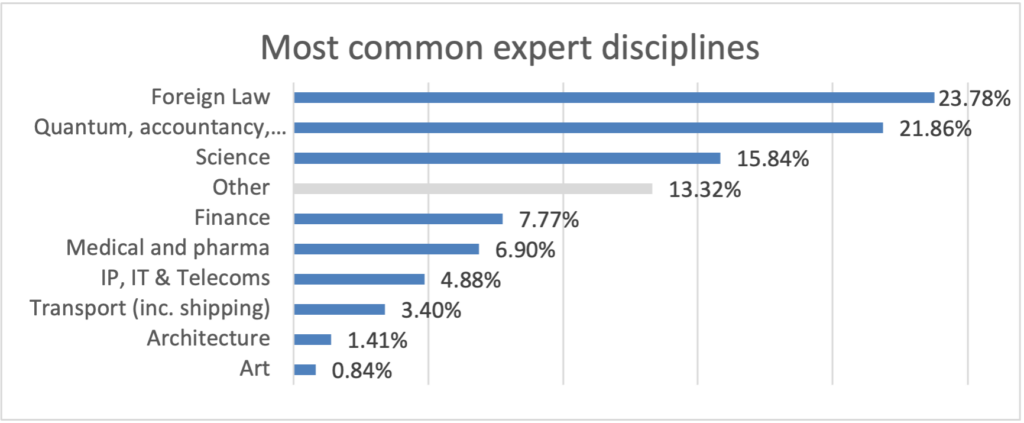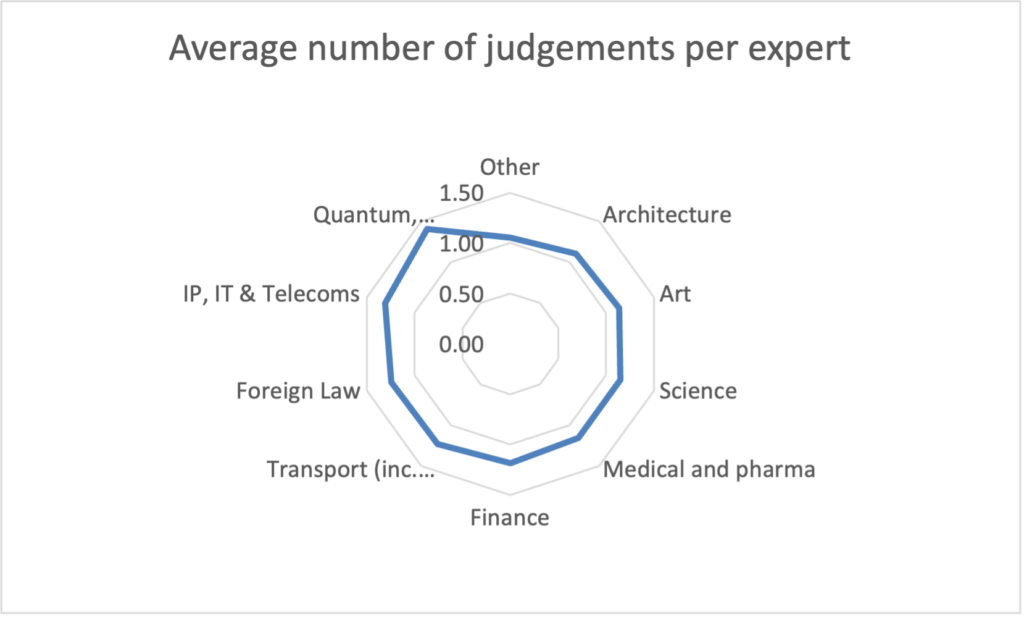Introduction
Expert testimony in legal cases is pivotal. These professionals offer specialised knowledge, clarifying complex details for judges and juries. Their insights often bridge the gap between intricate matters and the court’s understanding, shaping informed decisions.
Below, we examine the current trends in the use of expert evidence in commercial proceedings in England and Wales, as well as the most common and some unusual expert disciplines.
Rules on expert evidence
English courts have strict rules about adducing expert evidence and expert duties. These are set out in Civil Procedure Rules (Part 35), Practice Direction 35, Court Guides, relevant pre-action protocols, and overarching protocol principles.
The parties to the dispute have an overriding duty to restrict expert evidence to that which is reasonably required to resolve the proceedings. Each party must only call an expert or put an expert’s report in evidence with the court’s permission.
In complex commercial cases, parties can usually each instruct their expert witnesses. However, in certain situations, the court may opt for a different approach by appointing a single joint expert. This is generally appropriate only for peripheral and relatively uncontroversial issues in high-value cases.
In any event, the primary obligation of an expert witness is to the court. Their paramount duty is to provide impartial and unbiased opinions based on their expertise on the relevant issues in dispute. Regardless of who engages or pays them, the expert’s ultimate allegiance is, therefore, supposed to lie with the court free from any partiality.
Expertise Distribution
There is no comprehensive study on types of expert evidence in English commercial courts. However, Solomonic, a litigation analytics platform, provides insights into experts deployed in commercial proceedings. For this article, a dataset including 2,446 experts and 2,973 judgments had been studied. Solomonic collects positive and negative commentary made about particular experts (the dataset does not include judgments with neutral comments or no comments about expert evidence) and is limited to judgments since 2014 from Chancery Division (Business List, Financial List, Intellectual Property List, Insolvency & Company List (since January 2021)) and King’s Bench Division (Admiralty Court, Commercial Court, Financial List, Technology and Construction Court, Media & Communications List (since April 2020)).
Most common expert disciplines
The analysis of the Solomonic data shows that the most common expert disciplines are:
- Foreign law;
- Quantum, forensic accountancy, and valuations; and
- Science (including engineering, geology, chemistry, biology, etc.).

Foreign law
The courts in England and Wales commonly encounter matters involving foreign law. Unlike many continental legal systems, English courts traditionally considered foreign law not as a distinct category of law but as a matter of fact, though recognised as a “special” fact (King v Brandywine Reinsurance Co (UK) Ltd [2005] EWCA Civ 235, at paragraph 67). This requires the parties to plead the content and application of foreign law.
Where the specifics of the relevant foreign law are not explicitly stated in the case, the “presumption of similarity” applies (at paragraphs 112 and 119). This principle serves as a rule of evidence, permitting a judge to presume that the foreign law aligns with the applicable English law.
The English courts, particularly the Commercial Court, have substantial experience in dealing with and implementing foreign legal principles. For example, there is extensive English case law on the application of the Russian tort law rules (in particular, Article 1064 of the Russian Civil Code (Dmitry Vlasov, Dmitry Ilin. Russian tort law in the eyes of the English courts—Part 1. (2022) 43 The Company Lawyer, Issue 4.)).
Quantum, forensic accountancy, and valuations
Quantum, forensic accountancy, and valuation evidence have different purposes but are often performed by accounting professionals with broad expertise to cover these topics. While quantum experts focus on assessing damages, forensic accountants primarily delve into fraud detection, and valuation experts determine asset worth.
Science
Experts in science may be required in cases involving complicated technological aspects to explain intricate scientific concepts relevant to the case. Their role involves clarifying technical details, conducting experiments, or interpreting scientific data to help the court understand those matters.
Expert evidence is tailored to the issues in the case. By way of example, these might include:
- geologists, providing insights into reservoir analysis and drilling techniques;
- petroleum engineers, providing resource estimation in oil and gas disputes;
- mechanical or civil engineers might offer expertise in structural integrity, design defects, or failure analysis in engineering-related cases; and
- environmental scientists could be involved in assessing ecological impacts or compliance issues.
Unusual expertise
While foreign law and quantum are the most commonly used experts, the parties and the courts occasionally have to deal with niche areas of human knowledge.
Two examples (Yemeni criminality and Formula One sponsorship opportunities) are discussed below. These unique areas of expertise highlight the diverse range of disciplines that might be called upon in legal proceedings, reflecting the need for specialised knowledge to address specific, nuanced aspects of a case.
Yemeni criminality
Suez Fortune Investments Ltd & Piraeus Bank AE v. Talbot Underwriting Ltd & others [2019] EWHC 2599 (Comm) concerned the loss of the oil tanker Brillante Virtuoso and subsequent insurance claim made to recover the loss of the vessel.
In July 2011, seven armed men boarded the Brillante Virtuoso off the Yemeni coast, which was followed by an explosion in the engine room, leading to severe damage. The core dispute centred on whether the attack on the vessel was fortuitous or intentionally caused. The parties asked for permission to adduce expert evidence on Yemeni criminality. Mr Justice Teare highlighted the unusualness of such expert discipline.
Two experts had to consider the nature of crime in Yemen and the profile of Yemeni criminals and criminal gangs; the effect of the breakdown and corruption of government organisations, such as the Coast Guard, on criminal activity; the identity of the persons who had the means to carry out the attack (which included piracy off Yemen); the access of Yemeni government individuals/Yemeni criminals to the weapons and equipment used in the attack (at paragraph 123).
The Bank’s expert expressed the view that it was plausible to suggest the armed men were Yemeni pirates who planned to take the vessel to Somalia and then do a deal with Somali pirates, which involved sharing a ransom for the vessel and cargo. The Underwriters’ expert disagreed that that was plausible (at paragraph 115).
Following careful evaluation of factual and expert evidence, the Commercial Court found that the vessel was intentionally destroyed at the direction of its beneficial owner, Marios Iliopoulos.
Formula One sponsorship opportunities
In AMP Advisory & Management Partners AG v Force India Formula One Team Limited [2019] EWHC 2426 (Comm), a sports marketing company asserted that it had introduced the sponsorship opportunity with an Austrian water company (BWT) to the defendant Formula One team and had an agreement entitling them to a percentage of the net proceeds from the sponsorship deal.
Industry experts were involved and addressed three issues in their reports (at paragraph 23):
- the basis upon which sponsorship agents are typically engaged in Formula One;
- the nature of the agency agreements customarily used in Formula One;
- whether there is market practice in the Formula One industry for agents to receive a 15% commission up to €12,500,000 and 12% thereafter.
Factual evidence revealed that it was not the claimant but a third party who had introduced the sponsorship opportunity to Force India. Therefore, the expert questions became largely irrelevant.
The court decided that the value of AMP’s contribution to achieving the deal was limited in nature and, therefore, ordered Force India to pay for the benefits resulting from the services performed of £150,000.
Frequency of appearance
While some experts only appear in this capacity on a single occasion, there is a whole industry of “professional” experts whose main job is to act as experts in litigation and arbitration proceedings.
Solomonic data analysis shows that quantum and accountancy experts are more likely to appear in English courts more than once. They are followed by IT and foreign law experts.

Conclusion
The role of expert evidence in English commercial litigation is as diverse as the legal cases it serves. Examining Solomonic data provides a glimpse into the prevalence of specific expert disciplines, shedding light on the frequency and patterns of expert engagement. While foreign law, quantum, and science experts dominate, the legal landscape occasionally calls for unusual expertise, exemplified by cases involving Yemeni criminality and Formula One sponsorships.
Claimants, holding the burden of proof, often lead in expert engagements, leveraging these specialists to fortify their cases. The decision to instruct experts is strategic, influenced by factors such as evidential strength, initiative-taking case assembly, the shape of the pleaded issues and the nature of legal disputes. However, the courtroom narrative remains dynamic, with defendants often instructing their expert but having the option to accept claimants’ evidence, negotiate settlements, or even choose not to contest a claim.
